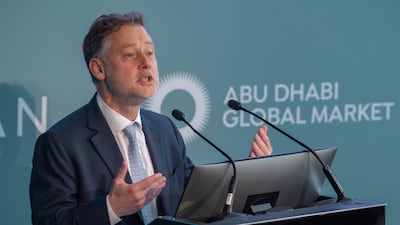The potential for hydrogen is extremely strong in the Middle East and North Africa, thanks to the region's focus on the low-carbon fuel, a senior industry executive has said.
"We think that hydrogen is the next place for Mena and Mena is the next place for hydrogen," said Pierre-Etienne Franc, chief executive of Paris-based hydrogen fund Hy24.
The fund hopes to attract many investors from the Mena region as it expands its Middle Eastern presence, he told a hydrogen summit in Abu Dhabi on Wednesday.
The company, a joint venture between European private equity firm Ardian and Zurich-based FiveT Hydrogen, will focus on developing new projects that address the infrastructure and technology requirements for the production of the low-carbon fuel, Mr Franc said.
Hy24, which is backed by large companies such as TotalEnergies and Baker Hughes, raised €2 billion ($2.15 billion) to invest in green hydrogen projects last year.
Hydrogen, which can be produced from renewable energy and natural gas, is expected to become a critical fuel as economies and industries transition to a low-carbon world.
It comes in various forms, including blue, green and grey. Blue and grey hydrogen are produced from natural gas, while green is derived from splitting water molecules through electrolysis.
French investment bank Natixis estimates that investment in hydrogen will exceed $300 billion by 2030.
“Many countries starting with the UAE have already developed hydrogen papers and hydrogen strategies, which [show] the priorities you want to put between local use, export [and] decarbonisation,” Mr Franc said.
The UAE is bullish on hydrogen and has been drawing up a comprehensive road map to position itself as an exporter of the clean fuel and tap into its future potential.
The Emirates is investing Dh600 billion ($163 billion) in clean and renewable energy projects over the next three decades as it aims to reach net-zero emissions by 2050.
Although a large pipeline of clean hydrogen projects has been announced in the Middle East, they will need international commitment and co-ordination to reach the final investment decision phase, Mr Franc said.
“Everyone is waiting for the others … to take risks to move into decision and this is the core of the topic that we need to solve now.”
Ardian, a partner in Hy24, opened an office in The Abu Dhabi Global Market in January as part of its regional expansion plans.
The private equity firm, which has $140 billion of assets under management worldwide, is exploring opportunities to deploy capital in Mena’s hydrogen industry through Hy24, Yacine Zarrouk, managing director of investor relations at Ardian, told The National on the sidelines of the event.
“We're working closely with the Abu Dhabi ecosystem [for] potential partnerships … it goes from the actual production [of hydrogen] to the entire value chain,” said Mr Zarrouk.
A potential recession will not affect Ardian’s investment plans in the region, he said.
“It's not the first economic cycle that we'll be facing. It's something that we have seen in the past.”
Nabil Nachi, head of Middle East and Africa new business at Hyundai, said that promoting the use of hydrogen in the region's mobility sector would require government subsidies.
Mr Nachi, who was speaking during a panel at the same event, said the Korean car maker was in touch with its UAE partners to introduce mobility projects ahead of the Cop28 climate conference in November.
“It's still a very expensive technology [and] that's why they need a kick-start, at least at the beginning,” Mr Nachi said.

